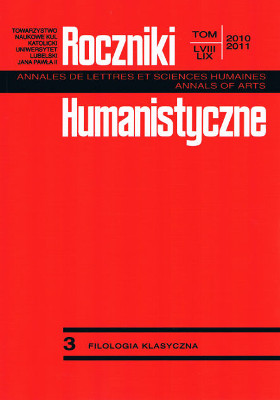“Nec Hercules contra plures”: The Literary Aspect of the Debate for Repeal of the Lex Oppia in the Ab Urbe Condita (34, 1-8) by Livy
Abstract
One of the most essential features of Roman historiography is the rhetoric. Historians differently understood the most renowned law in history which was expressed by Cicero in „De legibus I, V”: opus oratorium maxime. The extent and the way of applying rhetorical elements in a text depended on writer’s skills and literature fashion of the epoch.
Livy was one of the most eminent rhetors in the times of August. Thus, it is not astonishing that rhetorical device was used. Among another thing, it contained the agon of politicians. One of them is the subject of a consideration in this article. In such dispute, which was in fact a verbal duel, two politicians took part – consul Marcus Porcius Cato and not known tribune Lucius Valerius. The subject of contestation was abolition of the law Lex Oppia which was enacted in 215 BC during the Second Punic War. This act in a reasonably restrictive way limited the women’s expenses on luxury goods. Livy’s text regarding the debate is the oldest and the most extensive work concerning the course of agon. On the other hand , it is only known that such debate took place and may be it was connected with a serious social discussion and also that Cato took part in it. Livy, who gave the debate attention in first eight chapters of XXXIVth book also made from it well-elaborated literary episode in rhetorical sense. In the beginning and in the end of the work historian described the situation which took place on the streets of Rome – procession of courageously and unconventionally behaving women. In centre of episode there was oratorical duel between politicians.
The figure of Cato was created as a model of conservative politician, the defender of mores maiores, who by means of words was fighting with willfulness of women. Lucius Valerius is a conciliatory politician whose arguments are similar to the women’s methods of persuasion. Livy withstand the feminine way of speaking used by Valerius with Cato’s military vocabulary. Since it is known with no doubt that the Cato’s speech is a historians display of rhetorical abilities. Furthermore, their substantial value ought to be analyzed in the context of moral politics of August not as a republic narration.
References
Briscoe John: A Commentary on Livy Books XXXIV-XXXVII, Oxford 1981.
Crawford Michael: Rzym w okresie republiki, Warszawa 2005.
Culham Philis: The Lex Oppia, „Latomus” 41 (1982), s. 786-793.
Dixon Suzanne: Reading Roman women. Sources, Genres and Roman life, London 2001.
Lewandowski Ignacy: Historiografia rzymska, Poznań 2007.
Milnor Kristina: Gender, Domesticity, and the Age of Augustus, Inviting Private Life, Oxford 2008.
Pomeroy Sarah: Goddesses, whores, wives, and slaves. Women in classical antiquity, London 1994.
Purcell Nicholas: Livia and the womanhood of Rome, „Proceedings of the Cambridge Philological Society” 1986, s. 78 -105.
Vassaly Ann: Personality and Power; Livy’s depiction of the Appii Claudii in the first pentad, „Transactions of the American Philological Association” 117 (1987), s. 203-226.
Copyright (c) 2011 Roczniki Humanistyczne

This work is licensed under a Creative Commons Attribution-NonCommercial-NoDerivatives 4.0 International License.





